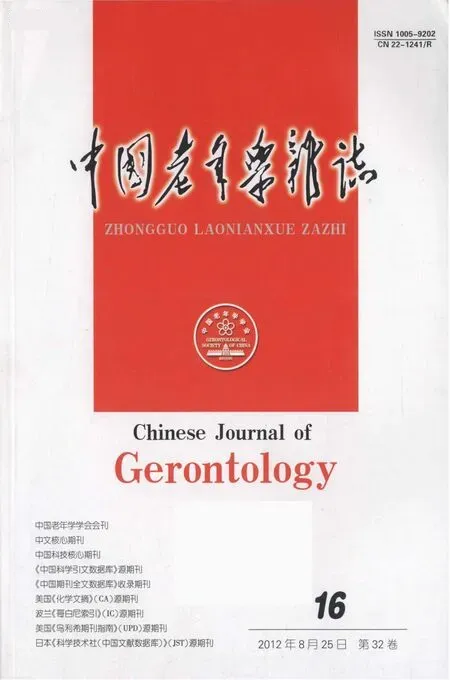高血壓腦出血患者短期預后的影響因素
李芳芳 羅 丹 謝 鵬 (重慶醫科大學附屬第一醫院神經內科,重慶 40006)
高血壓腦出血患者短期預后的影響因素
李芳芳1羅 丹1謝 鵬1(重慶醫科大學附屬第一醫院神經內科,重慶 400016)
目的 探討影響高血壓腦出血短期預后的相關因素。方法 回顧性分析366例高血壓腦出血患者病歷資料,根據臨床預后情況分為好轉(痊愈、進步)組和未好轉(病情無變化、惡化、死亡)組,比較分析其相關影響因素。用回歸分析篩選有獨立影響的預后因素。結果 性別、周圍血白細胞數、血小板、糖尿病史、收縮壓、舒張壓、占位效應、出血部位及肺部感染等因素與預后無顯著相關(均P>0.05);而意識障礙、D-二聚體(D-D)、合并腦疝、出血是否破入腦室和年齡等因素與預后相關(均P<0.05)。結論 維持血壓正常是預防高血壓腦出血的重要環節,積極預防和治療并發癥,對改善高血壓腦出血患者的預后具有重要意義。
高血壓腦出血;血壓
高血壓性腦出血是臨床常見的嚴重急性腦血管疾病,其30 d病死率高達35% ~52%〔1〕,是我國腦血管病中死亡率最高的臨床類型。有關高血壓腦出血的預后影響因素的研究結果一直存在爭議,本研究對高血壓腦出血患者預后影響因素進行單因素和多因素分析,以探討影響高血壓腦出血預后的獨立危險因素。
1 資料與方法
1.1 研究對象 2009年7月至2011年8月我院住院的高血壓腦出血患者366例,符合第四屆腦血管病會議修訂的診斷標準,且經頭顱CT或MRI確診。根據臨床預后情況分為兩組:好轉(痊愈、進步)組303例,男192例,女111例,年齡37~86〔平均(60.7±11.9)〕歲;未好轉(病情無變化、惡化、死亡)組63例,男47例,女16例,年齡26~89〔平均(65±12.9)〕歲。
1.2 統計學方法 采用SPSS17.0統計學軟件,單因素分析計量資料采用獨立樣本t檢驗,數據以±s表示。計數資料采用χ2檢驗,單因素分析篩選出的有統計學意義的變量再做多因素分析,多因素分析采用Logistic逐步向前回歸。
2 結果
2.1 單因素分析結果 兩組年齡、D-二聚體(D-D)、出血破入腦室、合并腦疝、意識障礙有顯著差異(P<0.05),而性別、周圍血白細胞數、血小板、糖尿病史、收縮壓、舒張壓、占位效應、出血部位及肺部感染無顯著差異(P>0.05)。見表1。
2.2 多因素分析結果 將上述單因素分析結果具有統計學意義的影響因素進行Logistic回歸分析表明:年齡、合并腦疝、意識障礙、D-D是高血壓腦出血患者預后不良的獨立危險因素(均P<0.05)。見表2。

表1 影響高血壓腦出血患者預后的單因素分析

表2 影響高血壓腦出血患者預后的多因素分析
3 討論
以往國外研究表明,起病時的意識狀態、血腫體積是決定腦出血預后最主要的因素,相對次要因素包括年齡、有無破入腦室及腦干損傷〔2〕。本研究發現,除上述因素外,D-D、合并腦疝也是顯著影響腦出血預后的相關因素。
意識障礙的水平是大腦損傷程度的具體體現之一,意識障礙是腦出血預后的獨立影響因素〔3〕,可作為判斷病情及預后的一個重要指標。意識障礙出現越早、越重說明患者病情嚴重,預后較差。40~70歲為最主要的腦出血發病年齡。老年人機體防御應激能力差,常伴有其他臟器疾病,一旦腦出血,并發癥發生率高,易致殘致死,存活質量差,年齡越大,預后也越差〔4〕。在高齡(>80歲)患者組中,年齡影響最大,Hemphill等〔5〕報道腦出血發病后30 d病死率在80歲以下組為39%,而在80歲及以上組為67%。
D-D是交聯纖維蛋白在纖溶酶作用下,D區降解肽片段,它能特異反映纖溶活性,只有在體內發生血栓性病變和繼發纖溶亢進時才有明顯改變,其水平升高反映血液凝固性增高及繼發性纖溶亢進〔6〕。本研究提示D-D可作為高血壓腦出血患者預后評估及指導治療的良好指標。腦疝主要發生在腦出血早期,早期血腦屏障破壞,使血腫周圍水腫帶和缺血體積擴大,促進腦疝發生、發展,一旦出現腦疝則難以搶救〔7〕。因此,早期積極處理有關臨床癥狀、體征及并發癥能使高血壓腦出血患者的病死率顯著降低,改善腦出血預后。
1 Broderick JP,Brott T,Tomsick T,et al.Intracerebral hemorrhage more than twice as common as subarachnoid hemorrhage〔J〕.J Neurosurg,1993;78(2):188-91.
2 Bhattathiri PS,Gregson B,Prasad KS,et al.Intraventricular hemorrhage and hydrocephalus after spontaneous intracerebral hemorrhage:results from the STICH tria〔l J〕.Acta Neurochir Suppl,2006;96(1):65-8.
3 Heppner P,Ellegala DB,Durieux M,et al.Contrast ultrasonographic assessment of cerebral perfusion in patients undergoing decompressive craniectomy for traumatic brain injury〔J〕.JNeurosurg,2006;104(5):738-45.
4 韓慶順,侯菊生.高血壓腦出血外科治療影響預后因素臨床分析〔J〕.現代康復,2000;4(5):720-1.
5 Hemphill JC,Bonovich DC,Besmertis L,et al.The ICH score:a simple,reliable grading scale for intracerebral hemorrhage〔J〕.Stroke,2001;32(4):891-7.
6 田 力,劉曉丹,滕偉禹.腦出血患者D-二聚體和纖維蛋白原降解產物的變化〔J〕.中國老年學雜志,2008;28(12):1091-2.
7 邱小鷹,王 何,林劍鋒,等.體溫升高對腦出血近期預后影響的臨床研究〔J〕.臨床薈萃,2005;20(23):1333-5.
Influence factors on the prognosis of patientsw ith hypertensive intracerebral hemorrhage in short term
LIFang-Fang,LUO Dan,XIE Peng.
Department of Neurology,the First A ffiliated Hospital,Chongqing M edical University,Chongqing 400016,China
Objective To detect the influence factors on the prognosis of patients with hypertensive intracerebral hemorrhage(HCH)in short term.M ethods 366 patients diagnosed as HCH were observed and retrospectively analyzed.According to clinical prognosis,they were divided into good(including recovery and improvement)and bad(including no change,deterioration and death)groups.The comparative analysis of the influence factors was done between the two groups.Logistic regression was used to screen the independent influence factors on the prognosis of patientswith HCH.Results The factors of gender,the number of leukocytes in peripheral blood,platelets,history of diabetes,systolic and diastolic pressures,mass effect,regions of hemorrhage and pulmonary infection were not correlated with prognosis(all P > 0.05).Other factors,such as disturbance of consciousness,D-dimer,cerebral hernia,rupture of intracerebral hematoma into the ventricle and age were highly related to prognosis(all P<0.05).Conclusions Tomaintain normal blood pressure is an important part of prevention of HCH,the active prevention and treatmentof complications are of great significance in improving the prognosis of patients with HCH.
Hypertensive intracerebral hemorrhage;Blood pressure
R743.34
A
1005-9202(2012)16-3423-02;
10.3969/j.issn.1005-9202.2012.16.030
國家重大科學研究計劃(973)項目(2009CB918300)
1 重慶醫科大學神經科學研究中心
謝 鵬(1958-),男,教授,博士生導師,主要從事神經病學研究。
李芳芳(1986-),女,碩士,主要從事神經病學研究。
〔2012-01-29收稿 2012-03-07修回〕
(編輯 曹夢園)

